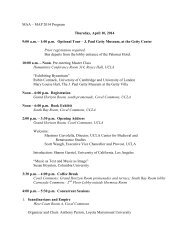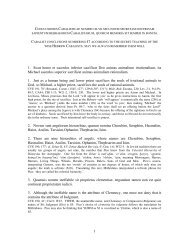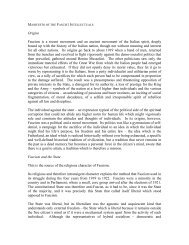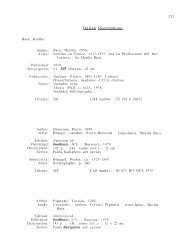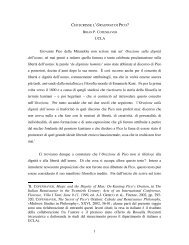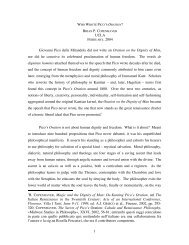1 (1) Pythagoras of Samos instructed the region of Italy once called ...
1 (1) Pythagoras of Samos instructed the region of Italy once called ...
1 (1) Pythagoras of Samos instructed the region of Italy once called ...
Create successful ePaper yourself
Turn your PDF publications into a flip-book with our unique Google optimized e-Paper software.
Your want is what I refuse, Dindymus, and<br />
Your refusal is what I want. 106<br />
(6) ‘The to-live,’ <strong>the</strong>n, is nothing o<strong>the</strong>r than ‘life,’ and ‘<strong>the</strong> to-run’ is nothing o<strong>the</strong>r than<br />
‘running,’ just as ‘to dance,’ ‘to read,’ ‘to hear’ and ‘to see’ with <strong>the</strong> article are just<br />
‘dancing,’ ‘reading,’ ‘hearing’ and ‘sight’; ‘to love’ with <strong>the</strong> article is ‘loving’ or ‘love,’<br />
‘to will’ likewise is ‘willing,’ ‘to know’ is ‘knowing,’ ‘and ‘to be able’ is ‘ability’ or<br />
‘might.’ When people speak crudely, this is why <strong>the</strong>y say ‘as much as I am able,’<br />
meaning ‘to <strong>the</strong> best <strong>of</strong> my ability’ or ‘with all my might’ or ‘if I have <strong>the</strong> strength.’ (7) I<br />
said that <strong>the</strong> Greeks apply <strong>the</strong> preposition with an article to <strong>the</strong> infinitive, as in en tô<br />
peripatein, en tô trechein, en tô petesthai, which have <strong>the</strong> same force as our gerunds ‘in<br />
walking,’ ‘in running,’ ‘in flying.’ Who does not know that <strong>the</strong>se are just <strong>the</strong> same as ‘in<br />
a walk,’ ‘in a run’ and ‘in a flight’? When infinitives are used in a nominal sense, <strong>the</strong>n,<br />
<strong>the</strong>y mean <strong>the</strong> same thing that <strong>the</strong>se nouns mean. Priscian’s understanding here is better<br />
than in <strong>the</strong> previous case: ‘But <strong>the</strong> infinitive means <strong>the</strong> same thing as <strong>the</strong> content <strong>of</strong> <strong>the</strong><br />
verb, for “to run” is “a run” and “to write” is “a writing” and “to read” is “a reading.”’ 107<br />
(8) Therefore, infinitives are <strong>of</strong>ten associated with nouns and with words declined like<br />
nouns, as in Persius:<br />
But it’s a fine thing to be pointed out, for ‘that’s him’<br />
to be said.<br />
And Terence in <strong>the</strong> Bro<strong>the</strong>rs:<br />
To plead your case in front <strong>of</strong> <strong>the</strong>m is always a better approach;<br />
and in <strong>the</strong> Eunuch:<br />
To love by long distance<br />
Is definitely better than nothing. 108<br />
Also ‘to read is good,’ ‘to run is useful,’ ‘to write is appropriate,’ ‘to philosophize is best’<br />
– <strong>the</strong>se examples from Priscian are quite good, but <strong>the</strong> ones I have chosen are more<br />
appropriate since I have connected adjectives with <strong>the</strong>se same infinitives as if <strong>the</strong>y were<br />
substantives, which Priscian does not do. 109 (9) I <strong>called</strong> <strong>the</strong> examples I have chosen more<br />
appropriate because I have followed Quintilian, who writes: ‘In <strong>the</strong> Satire, “and I noted<br />
our dreary way <strong>of</strong> living,” when he uses <strong>the</strong> infinitive verb in place <strong>of</strong> a noun, what he<br />
means is really “our life.”’ 110<br />
106 Zippel cites Pers. 1.9-10, 27; 5.53; Mart. Ep. 5.83.2.<br />
107 Zippel cites Prisc. Gramm. 18.4.43; above, 3.21.<br />
108 Pers. 1.28; Ter. Ad. 608; Eun. 640-1.<br />
109 Zippel cites Prisc. Gramm. 18.4.43.<br />
110 Zippel cites Quint. 9.3.9.<br />
28<br />
2/21/05 9:35 PM 28/44



